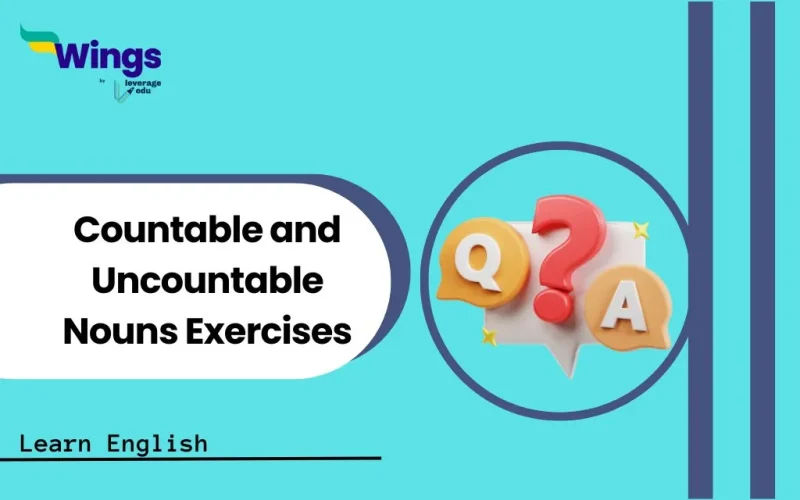Do you know how to use words like a, many, some, much and any in a sentence? Well, these words are part of the countable and uncountable nouns. As the name suggests, these nouns are those which can be counted or some which cannot be counted. To help you understand the usage of the following nouns in English grammar, we have compiled a few exercises which will help you test your knowledge about the same. Make sure you keep reading this blog post for more information.
This Blog Includes:
Countable and Uncountable Nouns Exercises with Answers
Here are some of the countable and uncountable nouns exercises, along with their answers, to help you understand this concept in a better way.
Q1. What are countable and uncountable nouns?
A1. Nouns are of two types: countable and uncountable nouns. Countable nouns are those which can be counted. For example, an apple, two oranges, three cats, and nine dogs. While, on the other hand, uncountable nouns are those which cannot be counted. For example, air, rice, water, coffee, information, and bread.
Q2. What is the difference between countable and uncountable nouns?
A2. Countable nouns can be counted and have singular and plural forms. While uncountable nouns cannot be counted and usually have no plural form.
Q3. What are the 10 examples of countable nouns?
A3. 10 examples of countable nouns are water, air, sugar, happiness, information, time, music, furniture, money and advice.
Q4. What are the 10 examples of uncountable nouns?
A4. 10 examples of uncountable nouns are book, apple, car, dog, house, flower, computer, pencil, friend and country.
Also Read: Countable and Uncountable Nouns: Rules, Examples, and Exercises
Countable and Uncountable Nouns Exercises: Sentence Completion
Now, we have offered you the sentence completion exercise for the countable and uncountable nouns, along with the correct answer.
Complete the sentences with the correct quantifier (much, many, a lot of, a little, a few).
- There aren’t _____ people at the party.
- I don’t have _____ time to finish my homework.
- He eats _____ chocolate.
- She has _____ books on her bookshelf.
- We need _____ milk for the cereal.
Check Answers:
- Many
- Much
- A lot of
- A few
- A lot of
Countable and Uncountable Nouns Exercises: Choose the Correct Word
Look at the countable and uncountable noun exercise by choosing the correct word.
Choose the correct word to complete the sentences.
- I need _____ (some/a) bread.
- There isn’t _____ (much/many) sugar left.
- She bought _____ (a/some) new shoes.
- Do you have _____ (any/many) questions?
- I’d like _____ (a/some) coffee, please.
Check Answers:
- Some
- Much
- A
- Any
- A
Also Read: 100 Examples of Countable Nouns in English [with PDF]
Countable and Uncountable Nouns Exercises
Indicate whether the nouns in parentheses are countable or uncountable.
- The teacher gave us _____ (homework).
- I saw _____ (birds) in the park.
- She has _____ (beautiful hair).
- Do you want _____ (water)?
- I need _____ (information) about the trip.
Answers:
- Uncountable
- Countable
- Uncountable
- Uncountable
- Uncountable
Complete the sentences with the correct countable or uncountable noun.
- I need advice about my career.
- Can you give me a glass of water?
- She has beautiful hair.
- I bought a new book yesterday.
- There is a lot of traffic on the road.
- We need some milk for the cereal.
- I saw a few birds in the park.
- He has many friends.
- Happiness is important.
- I need some information about the city.
Check Your Answers
- advice (uncountable)
- a glass of water (countable)
- beautiful hair (uncountable)
- a new book (countable)
- a lot of traffic (uncountable)
- some milk (uncountable)
- a few birds (countable)
- many friends (countable)
- Happiness (uncountable)
- some information (uncountable)
FAQs
Countable nouns are distinct individuals, groups of individuals, places, things, animals, or concepts that can be numbered in English grammar. Uncountable nouns cannot be counted since they are not discrete objects.
Yes, rice is an uncountable noun, which means that it cannot be counted. We cannot use numbers with uncountable nouns.
A tomato will come under the countable noun, which means that the number can be counted.
There are many types of nouns, which include common nouns, proper nouns, singular nouns, plural nouns, countable nouns, uncountable nouns, abstract nouns, concrete nouns, collective nouns and compound nouns.
Ten examples of countable nouns include apple, book, chair, cat, student, bottle, pen, car, flower, and phone. These nouns can be counted individually as one, two, three, and so on.
Check Related Reads on Learn English
This was all about the “countable and uncountable nouns exercises.” You can also follow the Learn English page of Leverage Edu for more exciting and informative blogs related to English grammar and the English language.


 One app for all your study abroad needs
One app for all your study abroad needs












 60,000+ students trusted us with their dreams. Take the first step today!
60,000+ students trusted us with their dreams. Take the first step today!